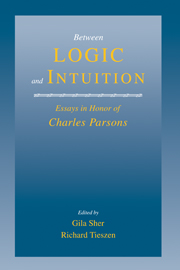Book contents
- Frontmatter
- Contents
- Preface
- I LOGIC
- Paradox Revisited I: Truth
- Paradox Revisited II: Sets – A Case of All or None?
- Truthlike and Truthful Operators
- ‘Everything’
- On Second-Order Logic and Natural Language
- The Logical Roots of Indeterminacy
- The Logic of Full Belief
- II INTUITION
- III NUMBERS, SETS AND CLASSES
- Name Index
The Logic of Full Belief
Published online by Cambridge University Press: 02 December 2009
- Frontmatter
- Contents
- Preface
- I LOGIC
- Paradox Revisited I: Truth
- Paradox Revisited II: Sets – A Case of All or None?
- Truthlike and Truthful Operators
- ‘Everything’
- On Second-Order Logic and Natural Language
- The Logical Roots of Indeterminacy
- The Logic of Full Belief
- II INTUITION
- III NUMBERS, SETS AND CLASSES
- Name Index
Summary
That logic has a prescriptive use as a system of standards regulating the way we ought to think is fairly noncontroversial. Frege (1967, pp. 12–13), the resolute antipsychologist, did not deny it. But Frege also thought that logic was a system of truths. The prescriptive force of logic derived from this together with a fundamental value commitment to believe what is true. According to this view, we ought also to believe the true laws of physics and to reason in conformity with them. To be sure, logic is distinguished from physics by virtue of the special status of its truths as “the most general laws, which prescribe universally the way in which one ought to think if one is to think at all” (Frege 1967, p. 12.) Still, the prescriptive use of logic is not what distinguishes it from physics. Both logic and physics as human activities aim to ascertain truths regarding certain subject matters. Logic differs from other natural sciences only insofar as its subject matter is objective truth itself. The imperative to seek truth and reason in conformity with it ought to be obeyed regardless of whether the true laws invoked are laws of objective truth as Frege took them to be or laws of physics.
Ramsey (1990, p. 80) rightly pointed out that undertaking to fulfill a value commitment to believe what is true is jousting at windmills:
We may agree that in some sense it is the business of logic to tell us what we ought to think; but the interpretation of this statement raises considerable difficulties. […]
- Type
- Chapter
- Information
- Between Logic and IntuitionEssays in Honor of Charles Parsons, pp. 124 - 152Publisher: Cambridge University PressPrint publication year: 2000



